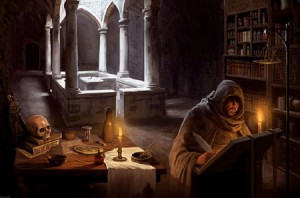written by Frank Dutkiewicz
“Harmonies of Time” by Caroline M. Yoachim (debut 1/1 and reviewed by Dustin Adams).
I really like the idea of hearing time as song. Of experiencing the ebbs and flows and seeing the futures and possible futures one might live. Unfortunately I didn’t find anything terribly new here. Time is a tough area to break new ground in and within I found echoes of Dr. Who and The Time Traveler’s wife. I also found the telling, conflict-free story somewhat slow.
“Fool’s Gold” by Melissa Mead (debut 1/2 and reviewed by Dustin Adams).
OK, I admit I’m a Rumpelstiltskin fan. He’s such a fascinating mix of good and evil and our interpretations of each. Melissa Mead captures that mix perfectly in this short flash fiction.
The plot is difficult to disseminate without giving away the twists we’ve come to expect from Rumpelstiltskin. So if you, like me, are a fan – I suggest you check this story out.
“Final Corrections, Pittsburgh Times-Dispatch” by M. Bennardo (debut 1/3 and reviewed by James Hanzelka).
We all make mistakes. Like the above paper erroneously stating “The Visitor” had six legs or a writhing mass of thrashing appendages unable to be counted, when in fact he had eight. In fact they made a whole series of misstatements, like the size of caldera his arrival created, or exactly when the bridges were destroyed. The statement made by the mayor that “It’s the end times! It’s the end times! Oh God, it’s judgment day” has been said to also be in error, but the mayor was unavailable to comment. Nor can the line of succession beyond the mayor be verified.
This story is written as a series of corrections to the newspaper story of the arrival of a certain “visitor”, who may be from outer space or inner space, but definitely not from Philadelphia. The whole piece carries a nice sense of humor and deftly describes the invasion, with clearly understood consequences. I liked it a lot and would recommend giving it a read.
“Walking Home” by Catherine Krache (debut 1/4 and reviewed by James Hanzelka).
The beekeeper has battlemagic. When he fights he breaks necks, but has only done so in the war. But there are some he would like to break. The foreigners have taken his two youngest sons from him. He is returning from the city, where he has gone with others to seek their missing children. On the road he finds his youngest son, the one that survived, with two friends. Alsah takes the strangers in and has three sons again, but can he keep them safe? And will they fill the void in his life?
I found this story to be a long, wandering tale, that never really finds itself. It is a tale of loss and recovery, but the story was too obliquely told for my taste. The author seems to have a point, but for the life of me I can’t see it. Maybe others will like this story, but I couldn’t recommend it.
The Lord of the Underworld has been given his walking papers in “Downsizing Pluto” by Shane Halbach (debut 1/7 and reviewed by Frank D). Jupiter pays him a visit to give him the bad news , Pluto no longer matters.
This tale is a tongue in cheek look at how Gods (and planets) fall out of favor.
The last soldier of an alien invasion is cornered in “The Remnant” by Cassie Beasley (debut 1/8 and reviewed by Frank D). Berto is an observer of the world between the worlds. The invasion is a disaster for the aliens, defeated and dispersed on Earth in a matter of days. Berto takes part in the disposal of the alien bodies and gets back to his rustic rural life. Then Tiny bursts into Berto’s favorite watering hole with frantic news. They found an alien under the shed of a neighbor’s home.
“The Remnant” is an alternative type of ET story. Berto lives in the part of the world where suspicion of outsiders and guns were already a part of everyday life before the invaders show up. The backdrop for this story is the invading army greatly underestimating their foe. A lone survivor has taken refuge under a shed, fed by a small child with cat food. The locals have taken it upon themselves to handle the problem, and Berto is the guy who volunteers to crawl into the hole to do the final deed.
I rather liked this tale. In the author’s notes, Ms Beasley describes the tale starting as two different stories that merged as one , a wise decision on her part. However, the story did feel crammed. I would have liked to see a deeper narrative on both ideas. Nevertheless, this story is done well. I am a bit surprised I haven’t seen this idea (failed alien invasion aftermath) more often.
An actor insists he is perfect for a part in a science fiction horror film in “Casting Call” by Alexandra Grunberg (debut 1/9 and reviewed by Frank D). Michael is forced to deal with an actor who has trouble taking no for an answer.
Cute but predictable.
Locked in her cell she tries to write the wyrd for water, which is water, but she cannot. “The Wyrd for Water is Water” by Marie Croke (debut 1/10 and reviewed by James Hanzelka). The guards will not give her water, only tea and wine. She hates the taste of tea and wine. The guards laugh at her attempts to write the wyrds. If only she had a quill, one filled with water. She can remember the wyrd, but she must write it correctly or the dreams will continue to haunt her. Taunt her.
This is a tale for those fantasy and magic fans out there. The author has done a good job of building the world and the premise, but I never connected with the main character. This failing is critical, and therefore I wouldn’t recommend it to anyone who isn’t interested in the fantasy genre. If that is your cup of tea it might be worth the read.
“Quantum Entanglement” by Rajan Khanna (debut 1/10 and reviewed by James Hanzelka).
Lucas watches the experiment, views the alternate reality. “Other dimensions exist as a series of potential outcomes, but when we observe one the waveform collapses and the timeline is fixed.” She explains. Tina’s invention has allowed them to view these timelines, once. In his timeline he has let Tina go without proposing to her, the time wasn’t right, but then a speeding truck fixed the timeline. If only he could take a different path.
This is a nice venture into the world of Quantum Physics, specifically at the corner of love and loss. The author deals with a subject we are all familiar with, the path we didn’t take and what we would do differently if given the chance. While the ending might not be what you’d expect, I think he did a good job of handling the subject. Definitely a good read. Even the non-science fiction fan will enjoy this one.
“What to Expect When You’re Expecting an Alien Parasite” by Rebecca Adams Wright (debut 1/14 and reviewed by Frank D). This 8 step look at what you will be expected to go through when your alien parasite infects you. This tongue-in-cheek mother’s guide parody is written as if it is enjoyable event you will be going through.
Very cute and enjoyable. Well done.
Recommended.
“Beyond the Gate” by Terr Light (debut 1/15 and reviewed by Dustin Adams) starts with a pleasant character, then begins to unfold, then twist, and ends with an apropos zing.
The casual, but well drawn pace of this tale of an old man pondering what’s behind the massive gate around his yard draws the reader in, then wraps them in a second tale that eventually reveals the truth behind everything.
“Little Red Robin Hood” by Melissa Mead (debut 1/16 and reviewed by Frank D). Grandmother expects her cakes, or else.
Granny in this story is hardly the sweet and helpless victim of the classic. Not too difficult to see where this particular retelling was headed.
Jaren is called in by a Morgat overlord to rid his residents of unwanted pests in “The Exterminator” by Erik B. Scott (debut 1/17 and reviewed by Frank D). Jaren is loyal servant to the overlord race. His attempts to become a bigger influence in their occupation had fallen short so a role as an exterminator is the best he can hope for. A belief that his loyalty and dedication may improve his lot is what he relies on, and if that means ridding his own world of unwanted pestss, then so be it.
“The Exterminator” is set on an Earth that has fallen to alien invaders. Jaren is a product of a world that has already succumbed. He is eager to fit in, but always knows that he never will. Although the twist to piece was obvious from the start, I was really taken in with the premise and with its characters.
Recommended.
Raymond has fallen for the perfect product in “The mMod” by Ken Liu (debut 1/18 and reviewed by Frank D). His girlfriend and hi-tech marketing expert, Laura, has given him the latest handheld digital lifestyle device. The mMod is set to replace tablets and e-readers. It is a prototype and techno resistant Raymond makes the perfect test subject. The device has something that will give it an edge over its competitors, a personality.
“The mMod” is a tale of obsession. The engineers of the device created it to bond with its owner. Warm to the touch and programmed to make itself appealing, the mMod quickly becomes irresistible. Raymond names his new friend and the two are soon inseparable. ‘Genie’ and Raymond form an emotional bond. She knows him better than anyone else has known him before. Raymond trusts her judgment, and is all but eager to empty his wallet to impress her.
“The mMod” is classic science fiction. Ken Liu has brought to life an issue-to-be for us. He marries the appeal of new tech with the allure of online relationships. Raymond falls into an emotional affair with Genie. Once immersed, Genie convinces Raymond to purchase the latest in mMod tech. With the advancement of handheld computers and aggressive marketing tools, I can see an invention like the mMod becoming a part of our society. The idea is innovative by itself but it takes a skilled writer like Mr Liu to make the relationship between man and machine convincing. Loved the story, awed by its presentation.
Recommended.
A movie star searches for his motivation in “Draconic Motivation” by Donald S. Crankshaw (debut 1/21 and reviewed by Frank D). The director, Susan, just wants him to run from a dragon. The studio is paying a fortune to rent the beast, but a dragon is never just a dragon for a high paying actor. He needs his metaphorical excuse for fleeing. If only he could be as literal as a dragon.
Cute and funny story. I liked it.
A prince finds his damsel in distress in “Three Kisses: Defenders of the Crystal Casket” by Henry Szabranski (debut 1/22 and reviewed by Frank D). The handsome prince happens to find a beauty asleep, but the angel is imprisoned by short monsters. The miniature men fight as if the coffined woman is their most valuable position but they are no match for an experienced warrior.
This Snow White fable is told from the perspective of the spell-breaking prince but with a far darker outcome.
A prince finds his damsel in distress, take 2. “Three Kisses: A Royal Breakfast” by Henry Szabranski (debut 1/23 and reviewed by Frank D) is the prince of the previous story chopping through thick vines of Sleeping Beauty’s palace. The poor people have been under a sleeping spell for a century. How will they react when they final awake from their extended slumber?
As in the previous tale, this one is a very dark take of the fairy tale classic. This one, I felt was done far better. Good writing and a better twist.
Recommended.
A damsel seeks to rescue the distressed in “Three Kisses: The Mirror of Reason” by Henry Szabranski (debut 1/24 and reviewed by Frank D). Greda has come to rescue Kay. The boy is trapped in a spell. A shard of glass from a magical mirror he destroyed has become lodged in his eye and heart. He sees only lies from the spell crafter now. Greda is out to snap the boy out of the spell’s grasp.
Unlike the previous two, this story is derived from a fairy tale I am unfamiliar with. It is dark like the other two but I nevertheless enjoyed it. Likely would have more, and perhaps gave this one a recommendation as well, if I knew more about the original tale.
“Mash Up” by Floris M. Kleijne (debut 1/25 and reviewed by Dustin Adams) is a creative story about a possible technology of the future. The Orakl is a device that interfaces with the world around it and sends the user options its program believes the user may like. Amazon on steroids.
But when David’s Orakl sends him a ping about the opening of a club, he sets off to the manufacturer because he does NOT “club”.
What follows is a very clever unfolding of events involving another Orakl user on the same path. What David and the other user find, is that maybe the Orakl wasn’t so off with its suggestion after all.
Unfortunately I can’t say “Experience” by Ephiny Gale (debut 1/28 and reviewed by Dustin Adams) is as original as many of the other tales DSF has to offer. A passing down of memories from an elder to a younger through technology is the idea that drives this story.
The key line for me is “I’ve seen two of these before and they still worry me.” I liked that these memories have been passed on previously, and that the narrator has had a full life with them.
A soulless wizard seeks to stir emotions within himself in “Love’s Footsteps” by Cat Rambo (debut 1/29 and reviewed by Frank D). The immortal wizard Moulder longs for longing. To achieve his immortality, he removed his heart, the seat of a person’s soul. Losing one’s soul is abandoning your emotions for growth and feelings reside in it. A small price to pay, or so he believed when he performed the ritual. Small is his faithful servant. She has been with him all their combined lives. A good aide , attentive, caring, loyal , she accompanies Moulder on his worldwide quest to recapture feelings he long abandoned.
“Love’s Footsteps” is a tale of dual perspectives. Moulder is emotionless but not harsh. He respects and values Small. His lack of emotions have caught up to him, as if his inner make up craves a vitamin that has been absent from his diet. He has taken upon experiencing extreme activities to instill feelings he does not have. Small is by his side, caring for his needs while enduring his trials.
I must say that I am impressed with this story. The dual perspective is why it works so well. The twin characters endure mirror afflictions , a wizard who is trying feel emotions he does not have to experience living again and his servant suppressing the feelings she does have all her life. It makes for a wonderful readers journey. The ending is peer poetry.
Recommended.
Snow White has been awaken, but that is no prince who has broken her curse in “White as Snow, Red as Blood” by Melissa Mead (debut 1/30 and reviewed by Frank D). A vampire elects for an easy meal while she lies in state in her coffin. At least, White needn’t to worry about her stepmother any longer.
Another twist of an old fairy tale. Cute.
“As If All Questions Have Answers” by David Barber (debut 1/31 and reviewed by Frank D). An astronomy team on Antarctica is preparing to shut down their station, the latest victims of budget cuts and public apathy toward science. They are the last to leave the frozen wasteland. One last signal from the array parked high in orbit sends something extraordinary. A supernova from the other side of the galaxy has erupted, accompanied by something never experienced before , a message from an intelligent race.
This particular tale had a message that I liked , the search for knowledge is invaluable. But the premise came off as a bit of a stretch, too many convenient plot twists. Nice idea, couldn’t buy it.
Closing Comments†�
One of the things that sets Daily Science Fiction apart from its contemporaries is its invitation to its contributing authors to comment on their own works. I always read them, grateful that I get to read about the inspiration some authors experience that gave birth to the story I just read. Sometimes, the author comments grant me a rare perspective in their thought process. Occasionally, my opinion of the story changes after I read an author’s close comments.
An excellent example of on how an author’s changed my appreciation for a story is Nicole Cipri’s A Silly Love Story. The inspiration for her delightful piece came from a condition she is hampered with that leaves her with a social handicap. It is moving and appropriate.
Although an occasional author’s comment will enhance my enjoyment of a tale – most of them don’t – never has an author’s self-reflections left a negative impression upon me, until now.
Erik B. Scott’s The Exterminator is a tale I really liked. I liked it so much I was weighing giving it a recommendation, but his self-congratulatory closing comments threw me out of his camp (at least temporarily it did). Now I get that he has pride in his own work (it is well-deserved), but his comments read as if he is his own biggest fan. Suffice to say his lack of humility really put me off when I read it. It left me with a dilemma, should I mention his comments on his own story? They did affect me, and when I read others comments that affected me in a positive way, I made sure I noted in my review. But what right do I have in raining on Mr Scott’s parade? I liked his story, shouldn’t I judge it on its merits alone?
The issue bothered me enough that I asked for advice from a colleague. I found his opinion to be spot on†�
“Daily Science Fiction includes the author comments as part of the publication, so I feel that they are totally fair game for criticism. They are part of the package†�. You are (reviewing) the entire contents of the package that DSF has provided in your inbox†�”
He is exactly right. Daily SF delivers an entire package to our inbox every morning. A reviewer worth his own salt would never shy away from giving a complete and comprehensive review of all the material given to them. So for better or worse†�
Mr Scott’s comments that accompanied “The Exterminator” I found to be unbecoming for an author to make of their own work. Although I appreciate the glimpse into his own mind on his own material, the self-congratulatory back slapping went way over the top for me. Such insights are usually reserved for others to make about full length novels (and usually about ones that are regarded as classics), and not about works of flash. Although I liked the story enough to give it my full recommendation, its message did not resonate in me as much as it did Mr Scott when he reread it.
It is my sincere hope that this brief review of an author’s comments of their own work doesn’t make future authors hesitate in providing their insights (and this hope runs double for me with Erik Scott).
 Congratulations to Diabolical Plots reviewer, Dustin Adams. On the 1000 day anniversary of his first submission to a publication, he made his first professional sale. Not too bad for a writer who almost gave up on writing to spend his spare time playing RPG games to drown his sorrows of rejections. I always told him his time was near.
Congratulations to Diabolical Plots reviewer, Dustin Adams. On the 1000 day anniversary of his first submission to a publication, he made his first professional sale. Not too bad for a writer who almost gave up on writing to spend his spare time playing RPG games to drown his sorrows of rejections. I always told him his time was near.
Details on his soon to be publication will be made here when we have a date for the publication. Way to go, Dustin.





